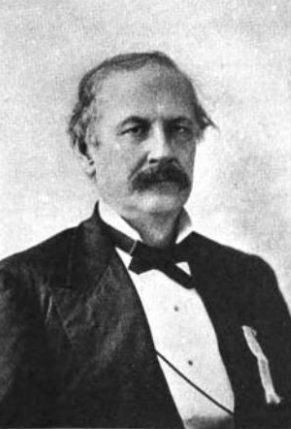James McNair Baker facts for kids
Quick facts for kids
James McNair Baker
|
|
|---|---|
 |
|
| Confederate States Senator from Florida |
|
| In office February 18, 1862 – May 10, 1865 |
|
| Preceded by | Constituency established |
| Succeeded by | Constituency abolished |
| Personal details | |
| Born | July 20, 1821 Robeson County, North Carolina, U.S. |
| Died | June 20, 1892 (aged 70) Jacksonville, Florida, U.S. |
| Political party | Democratic Know Nothing Whig |
| Relations | Gilchrist Baker Stockton (grandson) |
| Alma mater | Davidson College |
| Signature | |
James McNair Baker (born July 20, 1821 – died June 20, 1892) was an important lawyer and politician from Florida. He served as a Senator for Florida in the Confederate Congress during the American Civil War.
Contents
Early Life and Education
James McNair Baker was born in Robeson County, North Carolina. His parents were Archibald S. Baker and Catherine McCallum. He went to Davidson College in Davidson, North Carolina, and finished his studies in 1844. His family has a long history with the college. In fact, the Baker Sports Complex there is named after them.
Starting His Law Career
After college, Baker first started his law practice in Lumberton, North Carolina. However, he got sick with typhoid fever. Because of this, he decided to move to a warmer place. He traveled all the way to Florida on horseback.
Moving to Florida and New Beginnings
Once in Florida, James Baker set up his law practice again. He first worked in a place called Old Columbia, located on the Suwannee River. Later, he moved to a town named Alligator. He thought the name "Alligator" was not very inviting. So, he encouraged the people living there to change it to Lake City, which is its name today.
Early Steps in Politics
In 1852, Baker was chosen as the State Attorney for the Suwannee Circuit. This meant he was a lawyer who represented the state in court. He also went to a big meeting, called the Whig National Convention, in Baltimore. At this meeting, the Whig Party chose General Winfield Scott to run for President of the United States. Many people in Florida did not like Scott because of his role in the Seminole Wars. This made many voters turn away from the Whig Party.
Because of this, in 1856, Baker tried to get elected to the U.S. Congress. He ran as a candidate for the Know Nothing-Whig parties. Even though he traveled a lot across Florida on horseback to meet people, he did not win the election.
Becoming a Judge
In 1859, James Baker successfully won an election. He became a state judge for the 4th Judicial District, which met in Suwannee. In the same year, he got married to Miss Fanny Gilchrist.
Serving During the Civil War
During the important Election of 1860, Judge Baker supported the Constitutional Union ticket. He was against Florida leaving the United States, known as secession, after Abraham Lincoln was elected president. However, once Florida officially decided to secede, he supported his adopted state's decision.
Baker County and the Confederate Congress
In 1861, Judge Baker was still working as a judge. The Florida legislature decided to create a new county and named it Baker County in his honor. The next year, the same legislature chose him to be one of Florida's two senators. He served in the Confederate Congress. For the rest of the U.S. Civil War, he lived in Richmond, Virginia.
Life After the War
After the South lost the war in 1865, Baker returned to Florida. Governor David S. Walker quickly appointed him as a justice on the Florida Supreme Court. However, Florida adopted a new constitution in 1868 as part of the Reconstruction period. This new constitution meant he had to resign from his position. He then went back to working as a private lawyer.
For several years, he became very well-known for his legal work. This work often involved dealing with lands that were part of Florida's Internal Improvement Fund. This fund was created in 1855 to bring money from the North and help Florida grow.
Later Years and Retirement
By 1876, Baker was an active member of Florida's Democratic Executive Committee. He worked hard to help end the Reconstruction era in Florida. In 1881, Governor William Bloxham appointed him as a judge again for the state's 4th Judicial Circuit. He was appointed again in 1885 by the next Governor, Edward A. Perry. However, he had to resign in 1890 because his health was getting worse.
Judge Baker retired in Jacksonville. There, he became an elder in the Presbyterian church. He passed away at his home in Jacksonville, just one month before his seventy-first birthday. He was buried at Evergreen Cemetery nearby. He was survived by his wife and five children. Two of his sons also became well-known lawyers in Florida, following in his footsteps.
Images for kids
 | James Van Der Zee |
 | Alma Thomas |
 | Ellis Wilson |
 | Margaret Taylor-Burroughs |


